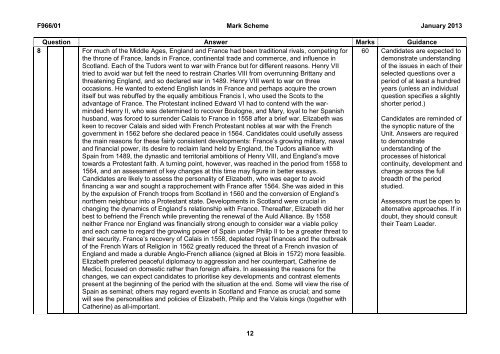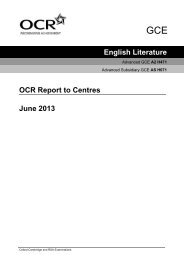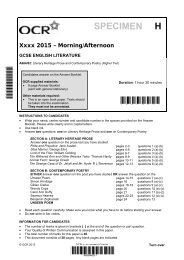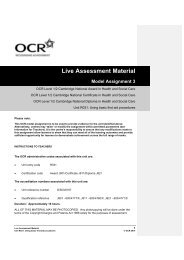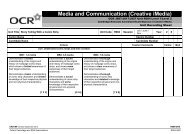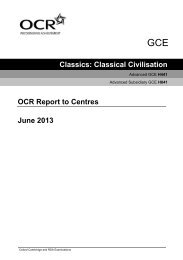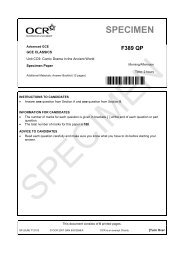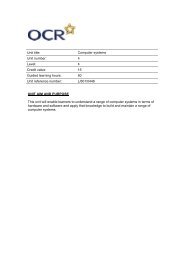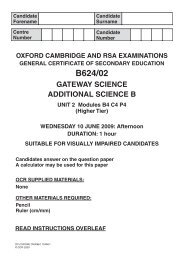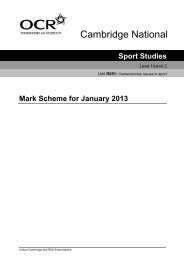Mark scheme - Unit F966/01 - Historical themes - Option A - OCR
Mark scheme - Unit F966/01 - Historical themes - Option A - OCR
Mark scheme - Unit F966/01 - Historical themes - Option A - OCR
Create successful ePaper yourself
Turn your PDF publications into a flip-book with our unique Google optimized e-Paper software.
<strong>F966</strong>/<strong>01</strong> <strong>Mark</strong> Scheme January 2<strong>01</strong>3<br />
Question Answer <strong>Mark</strong>s Guidance<br />
8 For much of the Middle Ages, England and France had been traditional rivals, competing for<br />
the throne of France, lands in France, continental trade and commerce, and influence in<br />
Scotland. Each of the Tudors went to war with France but for different reasons. Henry VII<br />
tried to avoid war but felt the need to restrain Charles VIII from overrunning Brittany and<br />
threatening England, and so declared war in 1489. Henry VIII went to war on three<br />
occasions. He wanted to extend English lands in France and perhaps acquire the crown<br />
itself but was rebuffed by the equally ambitious Francis I, who used the Scots to the<br />
advantage of France. The Protestant inclined Edward VI had to contend with the warminded<br />
Henry II, who was determined to recover Boulogne, and Mary, loyal to her Spanish<br />
husband, was forced to surrender Calais to France in 1558 after a brief war. Elizabeth was<br />
keen to recover Calais and sided with French Protestant nobles at war with the French<br />
government in 1562 before she declared peace in 1564. Candidates could usefully assess<br />
the main reasons for these fairly consistent developments: France’s growing military, naval<br />
and financial power, its desire to reclaim land held by England, the Tudors alliance with<br />
Spain from 1489, the dynastic and territorial ambitions of Henry VIII, and England’s move<br />
towards a Protestant faith. A turning point, however, was reached in the period from 1558 to<br />
1564, and an assessment of key changes at this time may figure in better essays.<br />
Candidates are likely to assess the personality of Elizabeth, who was eager to avoid<br />
financing a war and sought a rapprochement with France after 1564. She was aided in this<br />
by the expulsion of French troops from Scotland in 1560 and the conversion of England’s<br />
northern neighbour into a Protestant state. Developments in Scotland were crucial in<br />
changing the dynamics of England’s relationship with France. Thereafter, Elizabeth did her<br />
best to befriend the French while preventing the renewal of the Auld Alliance. By 1558<br />
neither France nor England was financially strong enough to consider war a viable policy<br />
and each came to regard the growing power of Spain under Philip II to be a greater threat to<br />
their security. France’s recovery of Calais in 1558, depleted royal finances and the outbreak<br />
of the French Wars of Religion in 1562 greatly reduced the threat of a French invasion of<br />
England and made a durable Anglo-French alliance (signed at Blois in 1572) more feasible.<br />
Elizabeth preferred peaceful diplomacy to aggression and her counterpart, Catherine de<br />
Medici, focused on domestic rather than foreign affairs. In assessing the reasons for the<br />
changes, we can expect candidates to prioritise key developments and contrast elements<br />
present at the beginning of the period with the situation at the end. Some will view the rise of<br />
Spain as seminal; others may regard events in Scotland and France as crucial; and some<br />
will see the personalities and policies of Elizabeth, Philip and the Valois kings (together with<br />
Catherine) as all-important.<br />
60 Candidates are expected to<br />
demonstrate understanding<br />
of the issues in each of their<br />
selected questions over a<br />
period of at least a hundred<br />
years (unless an individual<br />
question specifies a slightly<br />
shorter period.)<br />
Candidates are reminded of<br />
the synoptic nature of the<br />
<strong>Unit</strong>. Answers are required<br />
to demonstrate<br />
understanding of the<br />
processes of historical<br />
continuity, development and<br />
change across the full<br />
breadth of the period<br />
studied.<br />
Assessors must be open to<br />
alternative approaches. If in<br />
doubt, they should consult<br />
their Team Leader.<br />
12


